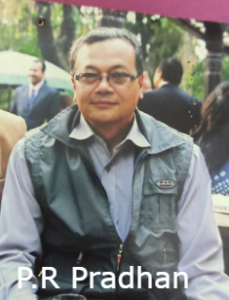-Pushpa Raj Pradhan
Chief Editor
The People’s Review Weekly
Kathmandu, Nepal

The country’s economy is not fine. The general sector expenditure is higher than the domestic revenue received by the government. The government is compelled to raise the deficit amount in the budget through debts. The country’s debt burden is also increasing alarmingly.
If the trend of taking debts will continue, very soon, the country will fall into a debt trap.
The country’s development sector expenditure is very nominal. Economic observers are putting pressure on the government for increasing capital expenditure by reducing the general sector expenditure, which is not an easy task for the government.
Of late, there has been seen some progress on the side of remittance revenue and also the balance of payments has seen positive, however, they are not satisfactory.
The decline in imports was witnessed due to the government ban on luxury items. Since the government has lifted such a ban, again, imports will increase and they will put pressure on the foreign currency reserve. We don’t have any items to export which would contribute to balancing foreign trade and importing foreign currency.
The businessmen are in agitation demanding reducing the bank interest rates, which is also a challenging task in the monetary market. Already, due to the continuous domination of imports, the Nepali currency has become very weak compared to the Indian currency.
Economic observers say that the real value of our currency could be 1 unit of Indian currency equals 2.5 rupees of Nepali currency. For the past three decades, there has not been made a review of the currency exchange rates between the Indian and Nepali currencies. As our currency has been overvalued compared to the Indian currency, the Hundi business has flourished and capital flight has been experienced, due to which, the banks frequently face a liquidity crunch.
All these financial anomalies have been seen due to the increasing expenditure on the non-productive sector. Sri Lanka has recently decided to cut down the size of its military force by 50 per cent. This is a process for reducing government expenditure.
From the economic scenario in Sri Lanka also, we should learn a lesson. Economic observers have warned that Nepal has not yet become another Sri Lanka but the nation is heading towards the Sri Lankan path. It means, if we will not correct the present practice of spending much on the non-productive sector, we will surely fall into an economic crisis soon.
To give a proper shape to our economy, we must scrap the provincial structure which will help save an attractive amount of funds spent on the provincial assemblies, provincial governments and other sectors. Similarly, reducing the size of the federal parliament by 50 per cent would help enormously reduce government expenditure. The concept of the proportional election has failed in Nepal. It has become the venue for electing party leaders’ wives and girlfriends.
Likewise, there is a trend of constituting different commissions unnecessarily. If scrapped such commissions government expenditure will be reduced.
Also, there has been seen the trend of appointing advisors and experts by prime ministers and ministers. Such advisors are assigned just to provide them with the opportunity to make money. The government secretaries are the true advisors of the prime minister and ministers. They can assign government officials as advisors by ending the practice of political appointment. If stopped assigning advisors and experts, the government can save a large amount of non-productive sector expenditure. Moreover, the number of local bodies should be reduced to 300 from the existing 753 local bodies. In such a way, we can make the political system sustainable.
Today, even those who were used by foreigners for introducing the present political system have already understood that the political system has become a white elephant and cannot function further. Indeed, the present political system was introduced to paralyze the country from all sides. If we have a little love for the nation, we must scrap the present political structure and return to the 1990 political structure without any delay.
Text courtesy: The people’s review weekly, dated January 18, 2023: Ed. Upadhyaya.
